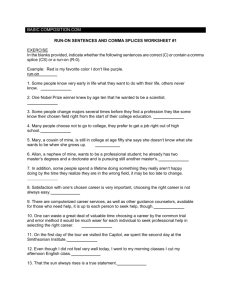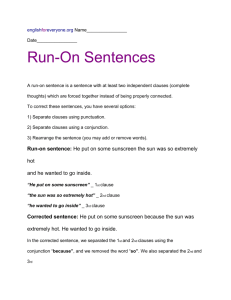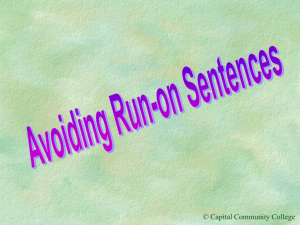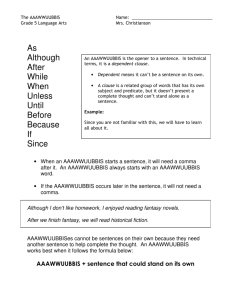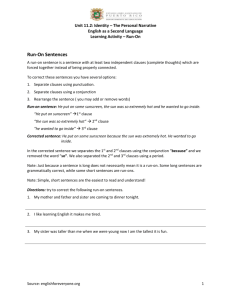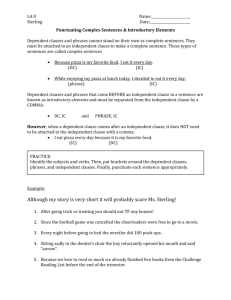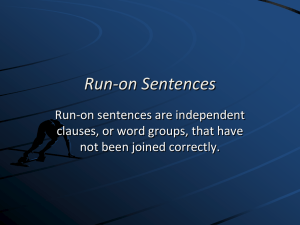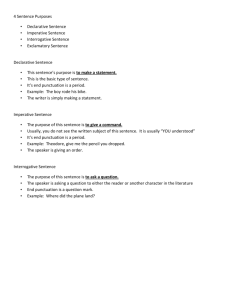Avoiding Run-on Sentences
advertisement
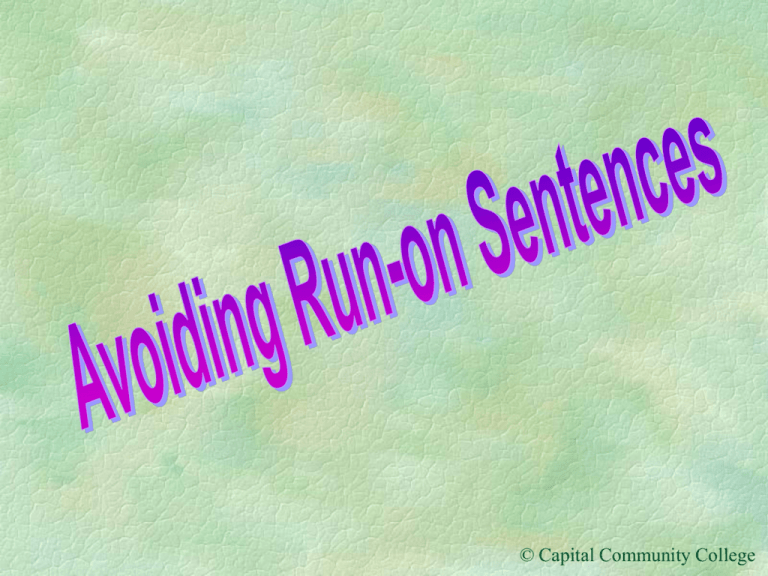
© Capital Community College CLAUSES A CLAUSE IS A GROUP OF WORDS WITH A SUBJECT AND A VERB. AN INDEPENDENT CLAUSE CAN STAND ALONE AS A SENTENCE. A DEPENDENT CLAUSE CANNOT STAND ALONE AS A SENTENCE. EVERY SENTENCE MUST HAVE AN INDEPENDENT CLAUSE; OTHERWISE, THE RESULT IS A SENTENCE FRAGMENT. © Capital Community College Avoiding Run-on Sentences The length of a sentence has nothing to do with whether or not a sentence is considered a run-on. An over-exuberant, runoff-at-the-mouth, 400-word gorilla of a sentence can be structurally fine. A run-on sentence is one in which two clauses have been connected incorrectly. (If you’d like, click on the word “clauses” to review that concept.) © Capital Community College Avoiding Run-on Sentences Let’s think of an independent clause as an independently operated train headed west . . . getting connected to another train headed east. Nothing but grief will result from coupling these train clauses incorrectly! For example. . . . Some students think they can study for an important exam by “cramming” all night, they are probably wrong. © Capital Community College Avoiding Run-on Sentences Some students think they can study for an important exam by “cramming” all night, they are probably wrong. This is an example of the dreaded COMMA SPLICE! A comma splice connects two independent clauses with only a comma. There are several ways to fix a comma splice. . . . © Capital Community College Avoiding Run-on Sentences 1. We can insert a period and start a new sentence. Some students think they can study for an important exam by “cramming” all night. They are probably wrong. 2. We can insert a comma plus a coordinating conjunction. Some students think they can study for an important exam by “cramming” all night, but they are probably wrong. 3. We can use a semicolon. Some students think they can study for an important exam by “cramming” all night; they are probably wrong. © Capital Community College COORDINATING CONJUNCTIONS, ALONG WITH A COMMA, CAN JOIN INDEPENDENT CLAUSES. Do not start a sentence with the words below. »AND, BUT, »OR, NOR, »FOR, SO, YET **To avoid fragments, do not start a sentence with a coordinating conjunction © Capital Community College Beware………… **To avoid fragments, do not start a sentence with a coordinating conjunction** © Capital Community College Don’t commit a personal foul…the dreaded FRAGMENT And no one will be admitted during the second act. Or we can take the test early as well. But the character does attempt to clear his wife’s name. For the opening band is Lennie Kravitz Nor will the movie start on time. © Capital Community College Using coordinating conjunctions properly (and, but, or, nor, for, so, yet): A SIMPLE SENTENCE contains 1 independent clause A COMPOUND SENTENCE contains 2 independent clauses Be careful….coordinating conjunctions don’t always need a comma © Capital Community College Let’s practice……. Mary Lou told a tale about a male, AND she yelled to a girl wearing a string of pearls. Notice how there is an independent clause on EACH SIDE OF THE CONJUNCTION. This is an example of a COMPOUND SENTENCE. © Capital Community College OTHER EXAMPLES… Everyone took his book to class and read for an hour. The sentence above is an example of a SIMPLE SENTENCE (only 1 independent clause…all we have here is a compound verb. No independent clause on each side of the conjunction. © Capital Community College Practice Mrs. Koon and her three beagles hunted all day in the swamp and then she grilled rattlesnake for dinner. Mrs. Koon and her best friend Beth shopped all day and ate dinner at Manzetti’s. © Capital Community College SIMPLE OR COMPOUND? Until the rain falls, we will have to water lawns less often and conserve other resources. Last night Mr. Blake left a message and he reminded us of our late start day. © Capital Community College SIMPLE OR COMPOUND? PUNCTUATE ACCORDINGLY You can take the test early or make it up after school. I will gladly help you with the paper but I will not correct your errors for you. Alicia gave me her money but did not take her receipt. Leroy wrote me a love letter but he forgot to sign his name. © Capital Community College Conjunctive Adverbs, along with proper punctuation, can also join two independent clauses KNOW THESE CONJUNCTIVE ADVERBS: Therefore, consequently, moreover, However, besides, thus, furthermore, As a result, for example, for instance, Hence, still, nevertheless © Capital Community College These words/phrases must be incorporated into your writing. They provide clear transitions, which help you to avoid “choppiness” between ideas Therefore, consequently, moreover, However, besides, thus, furthermore, As a result, for example, for instance, Hence, still, nevertheless © Capital Community College When using conjunctive adverbs, punctuate accordingly: We waited until the last minute to do our homework; therefore, we lost much sleep. Huck and Jim have more in common than we realize; for example, both are desperately seeking freedom from society. He was absent; as a result, he missed the test. The storm came during the night; however, we were still prepared to take cover. © Capital Community College BUT……be careful…… Sometimes conjunctive adverbs like HOWEVER and THEREFORE will simply interrupt one independent clause. When that is the case, punctuate accordingly: I will, however, give a speech later today. However, no one will see us if we are quiet. You can, therefore, take the test early. © Capital Community College Avoiding Run-on Sentences There are three situations in which run-on sentences are apt to happen: 1. When a pronoun in the second clause refers to a noun in the first clause: The President’s popularity has plummeted, she apparently underestimated the opposition. 2. When a suggestion or directive occurs in the second clause: You will be responsible for this material on the final exam, study it thoroughly now. 3. When two clauses are connected by a transitional expression: Many people think protectionism can halt rising prices, however, the opposite is actually true. © Capital Community College Avoiding Run-on Sentences 1. The President’s popularity has plummeted, and she apparently underestimated the opposition. 2. You will be responsible for this material on the final exam; study it thoroughly now. 3. Many people think protectionism can halt rising prices; however, the opposite is actually true. © Capital Community College Avoiding Run-on Sentences Now you’ll never again write a runon sentence! © Capital Community College
